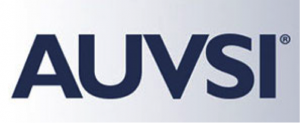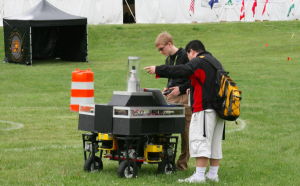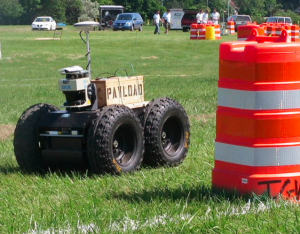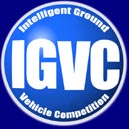Michigan Hosts Intelligent Vehicle Competition
Darcy Conlin
The preparation has begun and the vehicles are in the works. Rochester, Michigan’s Oakland University will host the 23rd Annual Intelligent Ground Vehicle Competition (IGVC) on June 5-8 with university teams working on civilian and military applications.
The IGVC promises not only spirited competition among like-minded engineering types, but the top finishers will win some money. This year’s event features 41 registered college, university and institution teams from the U.S, India, Oman, Australia, Canada, and Egypt.
Last year’s first place winners included Oakland University in the Auto-Nav Challenge, awarded $10,000; California State University-Northridge, in the Design Competition, awarded $3,000; IOP Challenge, Hosei University, Tokyo, $1,000; Rookie of the Year, Yale University, awarded $500; and the Grand Award winner was Oakland University.
The IGVC is sponsored by the Association for Unmanned Vehicle Systems International (AUVSI) along with the AUVSI Foundation.  At the conclusion of the event, all participating teams and results will have international recognition through AUVSI publications.
At the conclusion of the event, all participating teams and results will have international recognition through AUVSI publications.
The goal of the IGVC is to “advance and promote intelligent mobility for civilian and military ground  vehicle applications.” For intelligent mobility, the idea is to develop driver aids for the automated highway of the future.
vehicle applications.” For intelligent mobility, the idea is to develop driver aids for the automated highway of the future.
On the military side, the research will lead to systems that “enable unmanned combat vehicles to perform high risk operations and multiply the force effectiveness of manned systems.”
Students in the multidisciplinary event must use their knowledge of electrical, mechanical and computer science engineering to design, create, and build an intelligent vehicle. Registrants must work together as a team on their project, and have the skills to conduct some public relations for it as well. The stu dents must focus on discovery and innovation to dig into the emerging industries involved in the technology.
dents must focus on discovery and innovation to dig into the emerging industries involved in the technology.
Along with the actual vehicle, each team must provide a written report that outlines the conceptual design of the vehicle and its components. This paper should highlight the vehicle’s innovative design, and review its intelligence aspects. A template of this report can be downloaded here and follows a modified version of the American Astronautical Society (AAS) paper format that is used by the Association for Unmanned Vehicle Systems International (AUVSI). The photos for this story are from the 2013 competition.
Awards for the events include:
- Grand Award; trophies presented to the top three teams that perform the best in all four competitions;
- Auto-Nav Challenge Competition; 1st Place $5,000;
- Vehicle Design Competition; 1st Place $3,000;
- IOP Challenge; 1st Place $3,000;
- Rookie-of-the-Year Award; $1,000.
Click here for a complete list of awards and prize money. Here are the official competition details, rules and format.

